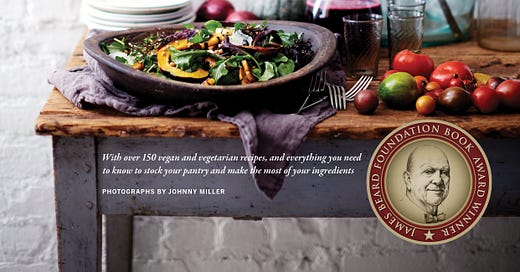TheGentleLaw Community
In her cookbook At Home in the Whole Food Kitchen, Amy Chaplin invites readers into a world where food is not only nourishing for the body but also for the soul. This beautifully crafted book offers over 200 plant-based, whole food recipes that celebrate the transformative power of mindful cooking and eating. While the book is a treasure trove for anyone interested in healthy, seasonal, and compassionate eating, its deeper connection to Buddhist principles makes it a perfect fit for those who seek to align their culinary practices with mindfulness and well-being.
A Journey into the Heart of Whole Foods
Chaplin’s approach to cooking is rooted in the idea that food should be simple, nourishing, and prepared with care. The recipes in At Home in the Whole Food Kitchen focus on using wholesome ingredients—think whole grains, fresh vegetables, legumes, nuts, and seeds—that not only support physical health but also contribute to emotional and spiritual balance. Each recipe is designed to maximize the natural flavors and benefits of the ingredients, allowing them to shine while promoting a deeper connection between the cook and the food.
The book is divided into thematic sections, including grains, legumes, vegetables, salads, and desserts, with each chapter offering a variety of dishes that encourage creativity in the kitchen while remaining grounded in the principles of simplicity and nourishment. One of the standout features of Chaplin’s approach is her focus on seasonality, which underscores the importance of eating foods that are in harmony with nature's cycles. This seasonal eating not only supports the health of the body but also fosters an awareness of the impermanent nature of life—an essential concept in Buddhism.
A Mindful Approach to Cooking and Eating
What sets At Home in the Whole Food Kitchen apart from other cookbooks is its ability to infuse every recipe with the spirit of mindfulness. Buddhism teaches that mindfulness is about being fully present in every moment, whether it’s in meditation, work, or even eating. The process of cooking, according to Chaplin, becomes an opportunity for mindfulness. By preparing food with intention and gratitude, we cultivate a deeper awareness of the ingredients and their transformative potential. Chaplin’s recipes encourage readers to slow down and savor each step, from chopping vegetables to simmering grains, making the act of cooking a meditative practice in itself.
In Buddhist teachings, food is not only a means of nourishment but also an offering. The concept of "right livelihood" in the Buddhist path extends to our relationship with food. By choosing ingredients that are organic, seasonal, and sustainably sourced, Chaplin’s approach aligns with this idea of offering something pure and wholesome to the body. Each meal prepared in the kitchen becomes an offering to oneself, a way of nurturing both body and mind.
The Compassionate Aspect of Whole Foods
A central tenet of Buddhism is compassion—compassion for all living beings, as well as for the environment. At Home in the Whole Food Kitchen aligns with this value by emphasizing plant-based, cruelty-free meals. The cookbook encourages readers to make choices that reduce harm to animals and the planet, advocating for a diet that is both health-conscious and environmentally sustainable. Chaplin’s focus on whole foods, rather than processed or animal-based ingredients, mirrors the Buddhist emphasis on living in a way that minimizes suffering and promotes peace.
For Buddhists, the practice of ahimsa (non-harm) extends to our food choices. By choosing plant-based meals, we reduce our participation in the systems that harm animals and exploit the Earth. Chaplin’s recipes allow those who follow Buddhist principles to eat in a way that aligns with their values—without compromising on flavor or nutritional value. The book offers practical solutions for those who want to embrace a compassionate lifestyle while savoring delicious, wholesome meals.
Keep reading with a 7-day free trial
Subscribe to The Gentle Law to keep reading this post and get 7 days of free access to the full post archives.





